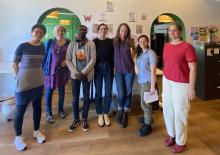June Yang began to work with Professor Zack Almquist's homelessness research projects in Spring 2023.
Before she knew it, nearly two years had passed. Through working on multiple projects under the broader umbrella of understanding homelessness in King County and beyond, Yang says she has grown tremendously—not just as an academic professional, but also as a Sociologist and a member of the society she studies.
Homelessness research projects have provided Yang with invaluable opportunities for academic and intellectual growth. In Spring 2023, she participated as a graduate student researcher on a UW project focused on collecting data to understand homelessness in King County. Stepping into the “real world” with prior training in design-based research methods and social network analysis, she quickly realized that learning to apply the Respondent-Driven Sampling method was just the beginning.
"Being directly involved in data collection gave me a deeper understanding of how datasets are built from the ground up--how every small decision shapes the final product," says Yang. "Connecting the critical gaps identified in knowledge, methodology, evidence, and data surrounding the unhoused population with our field work allowed me to learn the real art of research design."
Building on this work, Zack and Yang led the 2024 Data Science for Social Good (DSSG) project hosted by the eScience Institute, using the 2023 data to improve our understanding of not only unbiased population estimates of the unsheltered homeless community, but also the daily challenges and barriers they face. Applied research on homelessness has also expanded Yang's skill set beyond traditional social science methods. Survey administration, for example, is no small task. From recruiting and training student volunteers to managing logistics and overseeing data collection, the 2023 project often felt like a startup experience—demanding coordination, adaptability, and leadership.
Looking ahead to 2025, we aim to develop a software tool that facilitates data collection of higher frequency surveys, drawing from lessons learned in the 2023 UW project and the 2024 Point-in-Time Count administered by King County. Over time, Yang has come to see herself not only as a researcher but has also grown into a technical project manager. Zack and the students who have been working on this together became more than just colleagues—they are friends with whom she has shared an invaluable fieldwork experience.
Beyond the skills she has gained, Yang says "This research has profoundly deepened my sociological
imagination. Whether administering surveys, conducting focus groups, or interacting with unhoused participants, I have witnessed firsthand the vulnerability, isolation, and deep yearning to be seen that many homeless people experience. Engaging with this marginalized community has been humbling, challenging, and transformative."
Inequality and stratification have always been at the heart of Yang's sociological inquiries, and these direct interactions have given her research new meaning. It has reinforced her commitment to not just studying social issues, but to making a tangible impact.
